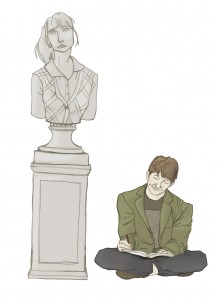Giving a Voice to the Manic Pixie Dream Girl
A disturbing parasite has wormed its way into the great indie-romance films of the last decade. Deceptively whimsical, whimsical, and exotic, this parasite is a woman–an overused, flat, and unrealistic depiction of a woman. Film critic Nathan Rabin coined the term in his review of the film Elizabethtown, writing that “the Manic Pixie Dream Girl exists solely in the fevered imaginations of sensitive writer-directors to teach broodingly soulful young men to embrace life and its infinite mysteries and adventures.” In the film Kirsten Dunst plays the love interest—a free-spirited, chatty airplane stewardess who provides the jolt of “life” Orlando Bloom’s depressed, sensitive character needs to escape his gloom and aimlessness. And so the first contemporary Manic Pixie Dream Girl was born.
Why all the fuss? The Manic Pixie Dream Girl (MPDG) is only a passive character, the dream girl, while the male character actively experiences growth and change through his love or infatuation with this effervescent goddess. Doree Shafrir, a pop culture blogger for The Daily Beast, describes Summer, the love interest in 500 Days of Summer, and other MPDGs as characters who “invariably serve as combination muse/object of obsession, usually allowing the guy in the equation to finally unlock his true creative impulses.” Tom’s experience with Summer inspires him to give up his unstimulating job as a greeting card writer and instead pursue his true love of architecture. She ends up being a tool to move the plot movement, rather than an actual character who has any meaning beyond her interaction with Tom. .
Zach Braff, writer, director, and star of the semi-autobiographical film Garden State says the film is about “love, for lack of a better term. And it’s a movie about awakening.” Natalie Portman’s character in the film, an epileptic free spirit, changes Zach Braff’s character’s life by inspiring him and supporting him to live a life without the medications he had been dependent on and by facilitating him to grow up. The MPDG is only a vessel for the male protagonist’s ascent to greater understanding.
 The MPDG is also exoticized; the protagonist wants to be with her because he wants to be with the type of person he perceives her to be, with certain whimsical and awesome attributes that will bring him pleasure. There is very rarely an exploration of her desires or wants. Most of the time, as in 500 Days of Summer, Tom projects all of his desires on her based on his very limited interaction with and knowledge of her, and thus throughout their relationship, he ignores the fact that she has indicated that she doesn’t do relationships. When they ultimately break up over it, he acts shocked. While these films represent the infatuation that can accompany falling in love, they generally only feature the male perspective. Shafrir writes that “of course, men find these women utterly bewitching. And why wouldn’t they? They’re the unattainable muses. They never make any demands; they never nag; they keep everything operating on a level of fantasy.”
The MPDG is also exoticized; the protagonist wants to be with her because he wants to be with the type of person he perceives her to be, with certain whimsical and awesome attributes that will bring him pleasure. There is very rarely an exploration of her desires or wants. Most of the time, as in 500 Days of Summer, Tom projects all of his desires on her based on his very limited interaction with and knowledge of her, and thus throughout their relationship, he ignores the fact that she has indicated that she doesn’t do relationships. When they ultimately break up over it, he acts shocked. While these films represent the infatuation that can accompany falling in love, they generally only feature the male perspective. Shafrir writes that “of course, men find these women utterly bewitching. And why wouldn’t they? They’re the unattainable muses. They never make any demands; they never nag; they keep everything operating on a level of fantasy.”
Because one usually only sees the male protagonist’s emotions, and events from his perspective of falling in love, the MPDG remains simply the object of affection, and is never a truly realized character. Staff writers at Pajiba, Dustin Rowles and TK, argue “that lack of character development was likely intentional — we’re meant to view the relationship from inside Tom Finn’s mind, and one person’s perspective never truly represents what’s really going on in a relationship as a whole.” While that may certainly be possible, it is so subtle that the audience may not register the “supposed” subversive nature of the character. And at the end of the film, the audience is given the indication that by falling for a girl named Autumn, he is beginning the cycle of a one-sided relationship again.
The abundance of these passive, whimsical characters in independent films that paint themselves as progressive and racially and gender-friendly have a detrimental affect on women’s self image. Watching these films that can make female viewers feel inadequate because the MPDG is treated like an unattainable perfection, but at the same time doesn’t resemble any realistic human being. These movies encourage women to turn themselves into someone resembling a Manic Pixie Dream Girl, in order to be worthy of being “loved,” someone who seems unique but doesn’t have desires or dreams that would burden the male lover’s fantasy. And even worse, men may begin to expect women to act like MPDGs, and not like actual women who have ambitions, desires, and flaws.
Wouldn’t it be refreshing for the film world, mainstream or indie, to finally produce a romantic comedy that, as Shafrir requests, is “about a woman who actually has opinions, who doesn’t play hard to get, who articulates her hopes and dreams and expects her boyfriend to get excited about those too?”
Or, as she continues, “Is that too much to ask?”

![[in]Visible Magazine](https://community.scrippscollege.edu/invisible/wp-content/uploads/sites/5/2011/04/Invisible-Masthead-2011-Spring1.png)







No comments yet... Be the first to leave a reply!